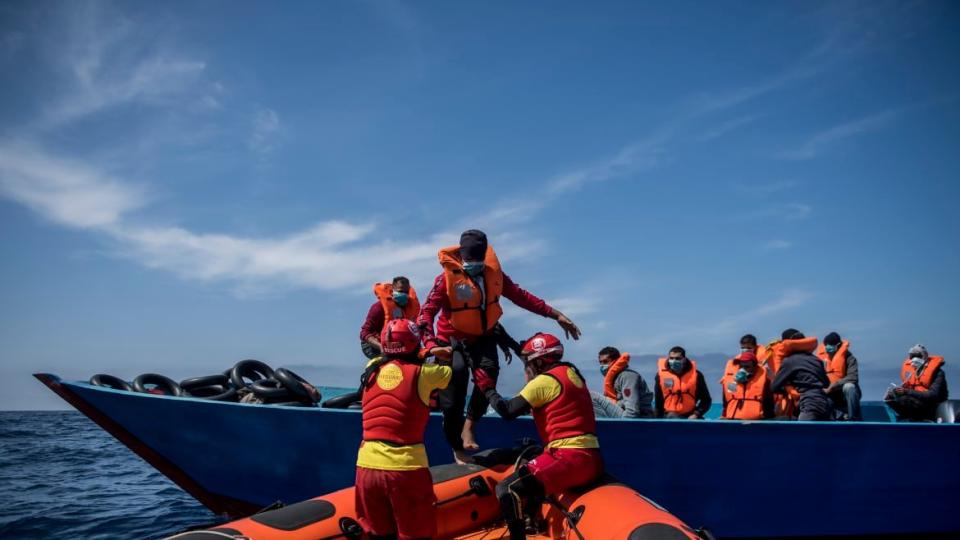Tunisia is on the Brink of a Civil War that Could Be Disastrous for Europe

ROME—A few months after the Arab Spring kicked off in a market square in Tunisia in late 2010, the blue wooden boats started dotting the horizon of the Mediterranean Sea. They were headed for the island of Lampedusa, a tourist enclave that has since become synonymous with Europe‘s disastrous approach to migration. More than 20,000 refugees crossed the sea in just two months, and then things got worse. As the Arab Spring burned its way across North Africa, the boats started coming from different directions: Libya, Egypt, and then Syria. By the end of 2011, nearly 130,000 people had made it to Italy. The years that followed saw an uptick in irregular migration and the death of more than 10,000 people desperately trying to cross the sea. The carcasses of dozens of boats, many still strewn with clothing and water bottles with Arabic writing, dotted the island’s coastline as Italy begged Europe for help and Europe largely ignored not only Italy but the crisis at large.
Migrants Rescued at Sea Between Death and Hope
The boats are back again. And Europe is once again seemingly oblivious to what else is on the horizon. On July 25, amid rising numbers of COVID cases and anger on the streets, Tunisian President Kais Saied sacked his government and seized executive control of the country, prompting U.S. National Security Adviser Jake Sullivan to urge him to find a “democratic path” to normalcy and to “rapidly form a new government, led by a capable prime minister to stabilize Tunisia’s economy and confront the COVID-19 pandemic, as well as ensuring the timely return of the elected parliament,” according to a statement from the White House National Security Council.
A week later, Said has only tightened the screws, and more boats filled with people desperate to escape both the pandemic and whatever comes next set sail for Italy.
Italian political scientist Angelo Panebianco wrote a scathing editorial in Corriere Della Sera this week reminding Italians that they had been through this before. “The Tunisian crisis should force us to open our eyes,” he said. “Europe has a serious security problem but does not seem to realize it. Professionals who in European countries, in various capacities, deal with it know this, but public opinions have not yet understood it.”
The “security problem” Panebianco is referring to is exacerbated this time by a change in the United States that has left the situation to other powerhouses like Russia, which has been bolstering its presence in the Mediterranean through alliances with Turkey where it is a major gas supplier. The increased presence, which has caused reverberations within NATO, was especially active during the Trump years when the U.S.’ relationship with NATO was also strained. Now that Joe Biden is in power, hopes that the U.S. would suddenly refocus attention on the region have not come through—at least not yet.
“Mother America seems willing to abandon the puppies to their fate, she no longer seems willing to protect them from looming threats,” Panebianco says. “America has changed and the threats have changed.”
Richard Sokolsky, a fellow and expert on Russia with the Carnegie Endowment for International Peace, warned in May that Russia’s return to the Mediterranean continues a long legacy of involvement there, “driven by ambitions, interests, and threat perceptions that have endured for centuries.”
“There is no reason to expect this posture to change in the near or distant future,” he says. “Russia is in the Mediterranean to stay, and its determination to expand its naval, air, and land presence there will continue.”
Italy, perhaps, is the country in Europe that best understands the threats of a destabilized North Africa. Since Mario Draghi took the helm of the government this spring, he and his foreign minister have made trips to Libya, despite its unsteady government. At the height of the Arab Spring, Silvio Berlusconi did the same, buddying up to then-leader Muammar Ghadaffi, a despot no one but the French would take seriously. But he did it to stem the wave of migration caused by unrest. That Italy’s leaders are pandering to a Libyan government not recognized by much of the Middle East underscores the urgency on Europe’s most porous border country.
Whether the U.S. would renew its interests in the region should things spiral out of control again is not certain. “The harsh polemics of Trump against Europe have been replaced by the smiles, the handshakes, and the slaps on the back of Biden,” Panebianco says. “At the moment there is no signal that suggests—except for a possible resumption of U.S. / Iran nuclear negotiations—a change in policy with respect to the times of the Trump administration regarding the Middle and Near East.”
In the last two days, NGO rescue ships have plucked more than 400 people out of the sea between the North African coast and Lampedusa. On Saturday alone, 600 people made it all the way to Lampedusa’s rocky shores from Tunisia in 15 boats traveling together. UNHCR says that in the last month, and especially as things heat up in Tunisia, boat departures from both Tunisia and Libya have seen a marked increase. “Whenever there is instability, departures from Tunisia increase,” said Flavio Di Giacomo, spokesman for the International Organisation for Migration. “It’s too early to say what will happen next.”
But it is not too early to prepare.
Get our top stories in your inbox every day. Sign up now!
Daily Beast Membership: Beast Inside goes deeper on the stories that matter to you. Learn more.

 Yahoo Finance
Yahoo Finance 